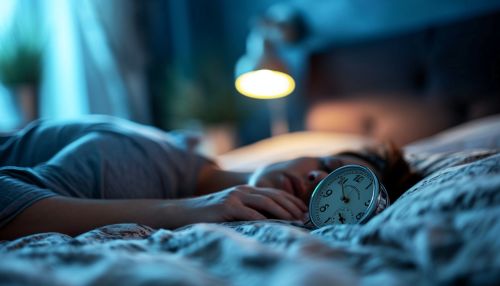Delayed sleep phase disorder
Overview
Delayed sleep phase disorder (DSPD), also known as delayed sleep phase syndrome or delayed sleep phase type, is a chronotype characterized by a sleep pattern that is delayed by two or more hours compared to the societal norm. This delay in falling asleep causes difficulty in waking up at the desired time. DSPD is the most common circadian rhythm sleep disorder, affecting as much as 15% of teenagers and adults.


Symptoms
The primary symptom of DSPD is an inability to fall asleep until very late at night, often not until the early morning hours, with the resultant difficulty in waking up at a socially acceptable time. This can lead to chronic sleep deprivation if the individual must wake up early for obligations such as school or work. Other symptoms can include a heavy feeling in the chest, difficulty concentrating, and a significant decrease in performance during the morning hours.
Causes
The exact cause of DSPD is unknown, but several factors have been implicated. These include genetic predisposition, altered sensitivity to light, and altered melatonin production. A mutation in the circadian gene PER3 has been associated with DSPD, as well as other sleep disorders.
Diagnosis
Diagnosis of DSPD is primarily based on a patient's sleep history. A detailed sleep diary or actigraphy, a non-invasive method of monitoring human rest/activity cycles, can provide supportive evidence. Polysomnography, a test that records your brain waves, the oxygen level in your blood, heart rate and breathing, as well as eye and leg movements during the study, is not typically needed unless another sleep disorder is suspected.
Treatment
Treatment for DSPD is focused on shifting the sleep-wake cycle to a more socially acceptable time. This can be achieved through a combination of chronotherapy, light therapy, and medication. Chronotherapy involves gradually delaying the bedtime until the desired bedtime is reached. Light therapy uses exposure to bright light upon waking to advance the circadian rhythm. Medications such as melatonin or short-acting hypnotics may also be used.
Prognosis
The prognosis for DSPD varies. Some individuals are able to successfully shift their sleep-wake cycle and maintain a more typical schedule. However, many individuals with DSPD find it difficult to maintain a normal sleep schedule, particularly if their natural sleep-wake cycle is significantly delayed.
Epidemiology
DSPD is thought to affect approximately 0.15% of adults. It is more common in adolescents, affecting up to 7% of teenagers. There is no known gender difference in prevalence.
Society and culture
The societal impact of DSPD is significant, as it can lead to academic and occupational difficulties, as well as social and psychological problems. Individuals with DSPD often struggle with morning obligations and may be perceived as lazy or unmotivated.
